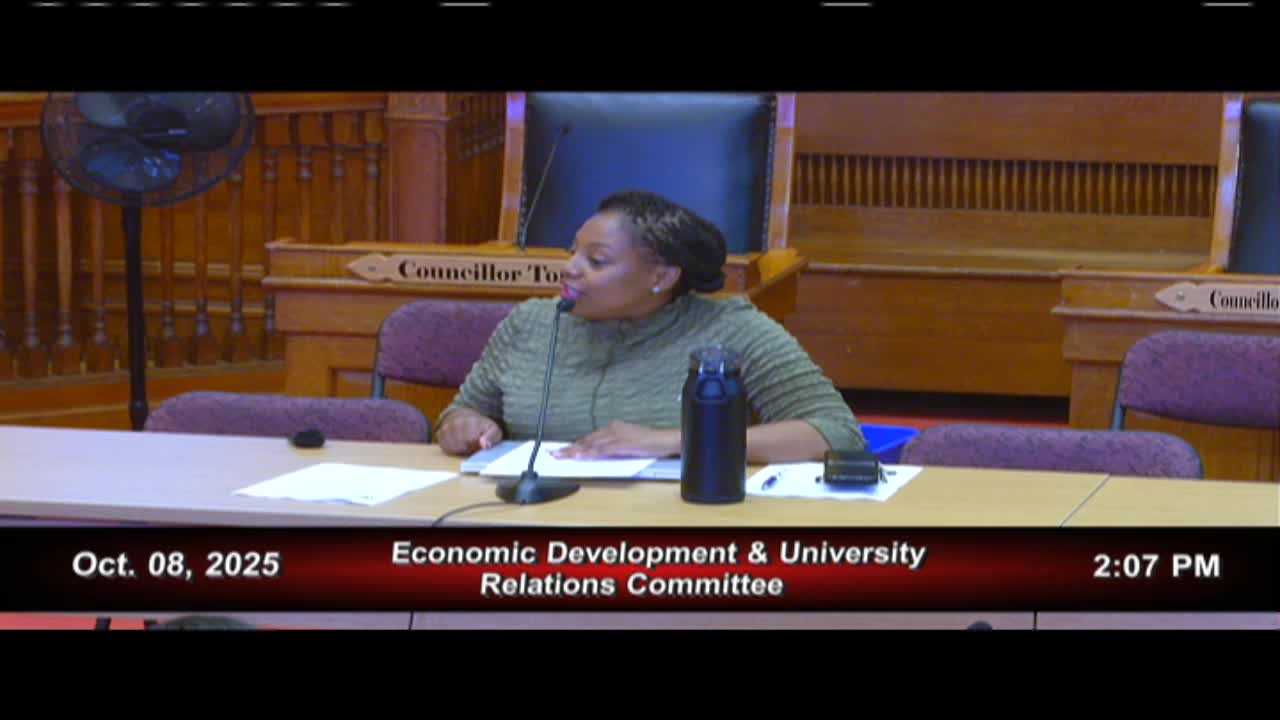Cambridge outlines $9 million+ in pandemic relief and ongoing small‑business supports
Get AI-powered insights, summaries, and transcripts
Subscribe
Summary
City staff reviewed technical assistance, grants and commercial‑district programs for small businesses, highlighted post‑pandemic trends and warned some federal funding and reimbursement rules limit program flexibility.
Cambridge’s Economic Opportunity and Development division told the City Council committee on Thursday that it awarded more than $9,000,000 in CARES, CDBG and ARPA funding to roughly 900 small businesses and business associations between 2020 and 2024 and is now shifting toward longer‑term technical assistance, succession planning and district activation programs.
The update, presented by Pardis Cifani, economic development staff, outlined three pillars of support — technical assistance, financial assistance and advocacy — and emphasized the division’s continued work on storefront improvements, ecommerce, accessibility and mentorship as businesses recover from pandemic impacts.
“During that four‑year period we gave a little over $9,000,000 in CARES, CDBG, and ARPA funding to small business owners and business associations,” Cifani said, noting more than 900 businesses received emergency support. She told the committee that many businesses lacked tax returns or profit‑and‑loss statements during the emergency grant rounds, which limited eligibility verification for pandemic loss claims.
City staff said grants and training now aim to address operational weaknesses revealed by the pandemic, including bookkeeping and digital literacy. Programs described include a storefront improvement program (property owners or tenants eligible for up to $50,000; certain accessibility work reimbursed at 90% up to $25,000), a small business enhancement grant (home‑based up to $2,000; brick‑and‑mortar up to $8,000), a retail interior accessibility reimbursement (90% up to $25,000), and an ecommerce grant (up to $4,000). Cifani noted federal HUD rules shape eligibility for some grants.
The division said it relaunched a shorter “Steps to Start Your Own Business” class in FY25, offers a six‑week Food Business Basics class and a six‑business mentorship pilot, and has added succession‑planning workshops tied to the new Massachusetts Center for Employee Ownership.
Cifani also showed a new public dashboard summarizing FY25 program activity, saying 54 grants were awarded in FY25 and that three federally funded grant programs use low‑to‑moderate income eligibility or microenterprise status (five or fewer employees) to qualify recipients. She said an updated vacant storefront database showed a 21% drop in vacancies from the previous fall to the current fall.
Matt Nelson of the city manager’s office said the city has waived many public works and transportation fees for events in recent years and described interdepartmental work to reduce event costs and streamline support.
Discussion at the hearing highlighted ongoing limits: several speakers and councilors pressed for easier access for microenterprises and sole proprietors, and raised cash‑flow concerns tied to reimbursement‑style grants. Andrea Taylor Dunkley, a small business owner, said microbusinesses and solopreneurs often lack equitable access to funding and sometimes face very short application windows. Councilor Timothy Nolan and others asked staff to explore ways to reduce reimbursement delays; Cifani said typical reimbursement timing is four to six weeks, but staff have adjusted rules to reimburse some eligible purchases made in the prior six months at contract time to reduce upfront burdens.
The presentation also covered district programs — Boosting Business Blocks, Cambridge Nights (pilot nightlife support), and Cambridge Blaze (plaza activations) — and partnerships for market research and supplier diversity outreach.
Discussion vs. decision: the committee heard an informational briefing and public comments and did not adopt new policy or funding at this meeting. Actions taken were limited to the committee’s routine adjournment vote.
Looking ahead, staff said they will continue outreach to business associations, explore legal‑services support for entrepreneurs, coordinate with other city departments on permitting and event costs, and work with state and regional partners on employee ownership and supplier certification.
